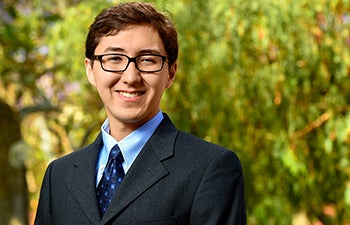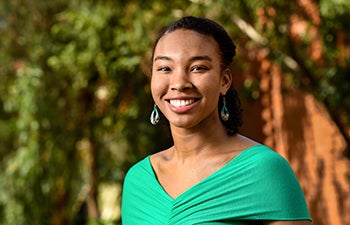Standard of Excellence
Alexander Yuen — Valedictorian
When Alexander Yuen steps to the podium on Friday to give his valedictory address at USC’s 132nd commencement, it’ll be with a sense of trepidation and déjà vu.
The last time he tried this — four years ago, as valedictorian of Elk Grove High School near Sacramento — he’d promised himself never again.
“I’m not the best speaker,” said the self-deprecating young man with a 4.0 GPA and double-majors in biological science and health promotion and disease prevention studies.
He’s more comfortable behind a microscope than in front of a crowd of 40,000 people. But as Yuen’s senior year rolled around, he felt a moral compulsion to speak again.
“I applied to be valedictorian because my conscience didn’t leave me another choice,” he said. “USC has fostered my growth in so many ways, including in public speaking, that I felt I had to honor the university.”
That sense of duty, honor and humility — qualities one might expect to find in a soldier, not in a future physician — runs deep in Yuen.
Asked why he wants to be a doctor, Yuen replied, “Because it’s the right thing to do.”
For years he’s watched his father, a pulmonary specialist at Methodist Hospital of Sacramento, work with the most critically ill patients.
When he was old enough, Yuen started volunteering in the emergency room and intensive care unit. He sees his own future working in critical care, though his mother — a first-grade teacher whom Yuen describes as “a miracle worker” — would prefer he choose a less emotionally and physically taxing specialty, having seen the toll it takes on her husband.
“It’s hard,” Yuen explained, “working with extremely sick or extremely injured patients. But it’s what we go into the medical profession to do. It’s an honor to serve.”

Valedictorian Andrew Yuen. Photos by Gus Ruelas.
The decision to come to USC was easy. Yuen didn’t apply anyplace else. He’d been dazzled by the glowing accounts from Harry Khasigian ’70, MD ’74, an orthopaedic surgeon at Methodist Hospital. A summer spent in the university’s Future Physicians pre-college program confirmed everything Yuen had heard.
“I fell in love with USC,” he recalled. “I was introduced to the traditions, like kicking the flag posts. I sat down with George Tirebiter, who reminded me of my own dog. There was an air of tradition and knowledge permeating the entire campus. I absolutely loved it.”
The last four years were packed with life-changing experiences. Through the Freshman Science Honors program, Yuen got to work in the lab of David Caron, professor of biological sciences at USC Dornsife, focusing on Pseudo-nitzchia, a phytoplankton species capable of causing harmful algal bloom events. Pseudo-nitzschia produces a neurotoxin that, if ingested by humans, causes a condition known as amnesic shellfish poisoning, resulting in severe memory loss, brain damage and even death.
Early in his freshman year, Yuen also joined USC’s Asian Pacific American Medical Student Association (APAMSA). The club goes to health fairs and service events around Los Angeles, measuring BMI and checking blood glucose levels, screening for hepatitis B and adding names to the bone marrow registry. As a Spanish speaker, Yuen often found himself translating and administering the tests.
He was shocked to discover how many Angelenos rely on such events for basic care and consultations.
“I started realizing the need for doctors to be involved in the community as providers of public health services and information,” he said.
The realization prompted Yuen to add a second major during his sophomore year, in health promotion and disease prevention studies, and to take on leadership roles in APAMSA. He’s been the group’s president for the past two years.
Next year, he’ll enter UCLA’s Geffen School of Medicine.
“I’m going to finally learn to be a physician,” he said. “Learn the clinical science, interact with patients, be the doctor I aspire to be. And serve Los Angeles for another four years.”
Carrie Ruth Moore — Salutatorian
Carrie Ruth Moore came to USC expecting to become a filmmaker, decided she instead wanted to write fiction and now has every intention of being a teacher. The last four years have been a journey of self-discovery for the Atlanta native who is this year’s salutatorian.
A creative writing major with a minor in American studies and ethnicity at the USC Dornsife College of Letters, Arts and Sciences, Moore fully embraced the license to reinvent herself, making the most of every undergraduate experience USC had to offer while achieving a near-perfect 3.99 GPA.
“I really felt at USC I could be any person I wanted to be and have resources to study anything I wanted to study,” she said.
So Moore sang with the all-female Oriana Women’s Choir and later joined the popular Saved by Grace Gospel Choir. She threw herself into the classics with the Thematic Option honors program. As a lifestyle writer for the Daily Trojan, she covered the Academy Awards and interviewed Jada Pinkett-Smith.
As a research assistant to historian Francille Wilson, she pored over hundreds of articles penned by little-known 19th-century black suffragettes. She dug into other meaty research projects for faculty mentors Michelle Gordon and Dana Johnson, and presented her own scholarly papers at national humanities conferences. She also assembled a portfolio of meticulously crafted short fiction, winning several undergraduate writing prizes.
Perhaps her most transformative experiences, however, were traveling to Thailand to teach English to rural schoolchildren and sharing her love of literature with youngsters in South Los Angeles through a series of service-learning projects through the Joint Educational Project.
Those experiences cemented Moore’s decision to be a teacher.
“I really felt like I didn’t just want to sit at home and write,” she said. “I wanted to be able to work in classrooms that needed help.”

Salutatorian Carrie Moore.
In June, she’ll begin an accelerated M.Ed. program at Stanford University that will put her in a classroom full of underserved Bay Area youths every morning and in graduate education courses every afternoon. At the end of the program, she’ll embark on her career as a high school English teacher. She plans to continue writing fiction by night.
Like much of her generation, Moore sees herself as a change-maker.
“I read somewhere that teachers normally come from the bottom 25 percent of their graduating class,” she said. “That really frustrated me. Education is so important, and everyone should have access to good teachers and good schools.”
Instead of grumbling about what can’t be helped, she looked in the mirror and asked “what can I do?”
“I’m sitting here as salutatorian of my class,” she explained. “I’m definitely not in the bottom 25 percent. And I think high-achieving teachers can be a good thing for students and a good thing for education.
It was at USC that Moore began to recognize how privileged she actually was. In elementary school, she won a lottery to attend a magnet program 45 minutes from her home. There she benefited from teachers (she’s especially grateful to mentors Chris Smith and Keysha Lee) and resources unavailable in her neighborhood.
“I’ve seen a lot of my friends, peers and even family members who did not go to that same school system, and our futures are so different,” she said.
Moore plans to address that inequality one child at a time, harnessing the power of fiction.
“Literature is transcendent,” she said. “You read a book and your life is changed. There are authors like Toni Morrison and Barbara Kingsolver, who have totally reshaped what I thought about love and death, race, global warming and community.”
Somewhere in the Bay Area, dozens of unsuspecting teenagers are about to have their minds expanded and lives changed.